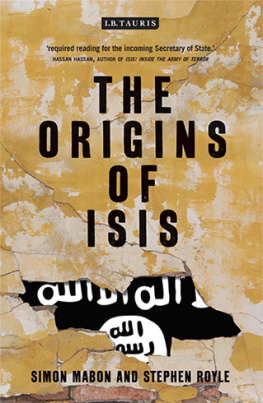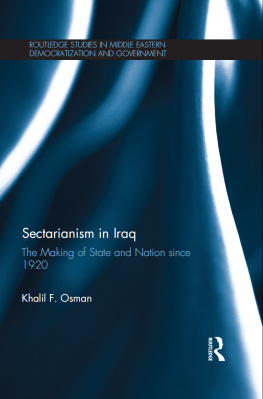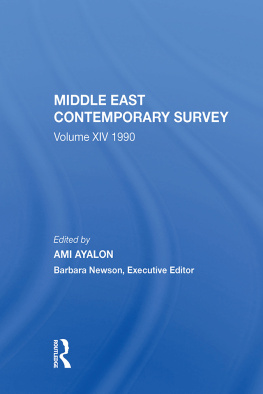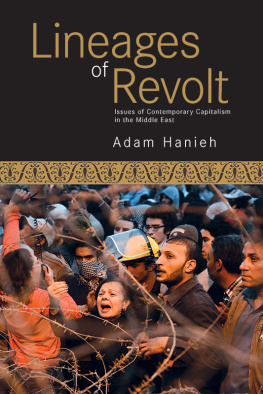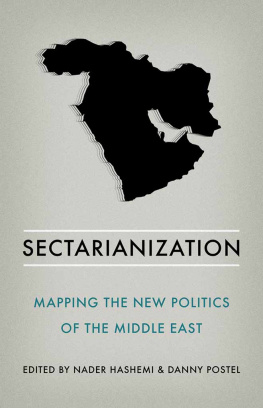Sectarianism in the Contemporary Middle East
In recent years, the term sectarianism has been widely used to explain contemporary affairs across the Middle East and North Africa. A range of assumptions about the nature of sectarianism have become prevalent amongst scholars and policy makers who engage with these areas, in part driven by the rivalry between Saudi Arabia and Iran (the two dominant Sunni and Shia states) and the emergence of ISIS. Despite its prevalence, few scholars have engaged critically with the meaning of the term and its application across the Middle East. Whilst many associate sectarianism with Islam, Sectarianism in the Contemporary Middle East interrogates the political, economic and security factors surrounding the term within both Islam and Judaism, leading to a better understanding of the contemporary politics of the Middle East.
This book was originally published as a special issue of Global Discourse.
Simon Mabon is a Lecturer in International Relations at the University of Lancaster, Director of the Richardson Institute and a Research Associate at the Foreign Policy Centre, UK.
Lucia Ardovini has recently been awarded her PhD in International Relations by the University of Lancaster, UK. She is a Post-Doctoral Research Fellow at the Swedish Institute of International Affairs and a Research Associate at the Richardson Institute.
Sectarianism in the Contemporary Middle East
Edited by
Simon Mabon and Lucia Ardovini
First published 2018
by Routledge
2 Park Square, Milton Park, Abingdon, Oxon, OX14 4RN, UK
and by Routledge
711 Third Avenue, New York, NY 10017, USA
Routledge is an imprint of the Taylor & Francis Group, an informa business
Chapters 13 & 512 2018 Taylor & Francis
Chapter 4 2018 Nicola Mathie. Originally published as Open Access.
With the exception of Chapter 4, no part of this book may be reprinted or reproduced or utilised in any form or by any electronic, mechanical, or other means, now known or hereafter invented, including photocopying and recording, or in any information storage or retrieval system, without permission in writing from the publishers. For details on the rights for Chapter 4, please see the chapters Open Access footnote.
Trademark notice: Product or corporate names may be trademarks or registered trademarks, and are used only for identification and explanation without intent to infringe.
British Library Cataloguing in Publication Data
A catalogue record for this book is available from the British Library
ISBN 13: 978-1-138-29964-1
Typeset in Myriad Pro
by RefineCatch Limited, Bungay, Suffolk
Publishers Note
The publisher accepts responsibility for any inconsistencies that may have arisen during the conversion of this book from journal articles to book chapters, namely the possible inclusion of journal terminology.
Disclaimer
Every effort has been made to contact copyright holders for their permission to reprint material in this book. The publishers would be grateful to hear from any copyright holder who is not here acknowledged and will undertake to rectify any errors or omissions in future editions of this book.
Contents
Citation Information
The following chapters were originally published in Global Discourse, volume 6, issue 4 (December 2016). When citing this material, please use the original page numbering for each article, as follows:
Chapter 1
People, sects and states: interrogating sectarianism in the contemporary Middle East
Simon Mabon and Lucia Ardovini
Global Discourse, volume 6, issue 4 (December 2016), pp. 551560
Chapter 2
Dehumanisation in religious and sectarian violence: the case of Islamic State
Gilbert Ramsay
Global Discourse, volume 6, issue 4 (December 2016), pp. 561578
Chapter 3
The politicisation of sectarianism in Egypt: creating an enemy the state vs. the Ikhwan
Lucia Ardovini
Global Discourse, volume 6, issue 4 (December 2016), pp. 579600
Chapter 4
Jewish sectarianism and the State of Israel
Nicola Mathie
Global Discourse, volume 6, issue 4 (December 2016), pp. 601629
Chapter 5
Reply: Bounding an elusive concept: response to Jewish Sectarianism and the State of Israel
Sarah V. Marsden
Global Discourse, volume 6, issue 4 (December 2016), pp. 630633
Chapter 6
Social protest and the political economy of sectarianism in Lebanon
Hannes Baumann
Global Discourse, volume 6, issue 4 (December 2016), pp. 634649
Chapter 7
Lebanons consociational model, Christian parties and the struggle for political power in post-2005 period
Abbas Assi
Global Discourse, volume 6, issue 4 (December 2016), pp. 650672
Chapter 8
Reply: Communalism and consociational democracy: a response to Abbas Assi
Thomas Scheffler
Global Discourse, volume 6, issue 4 (December 2016), pp. 673676
Chapter 9
Contested spaces and sectarian narratives in post-uprising Bahrain
Sossie Kasbarian and Simon Mabon
Global Discourse, volume 6, issue 4 (December 2016), pp. 677696
Chapter 10
Hamas and the trap of sectarianism?
Nina Musgrave
Global Discourse, volume 6, issue 4 (December 2016), pp. 697708
Chapter 11
Reply: The structure of sectarianism: response to Hamas and the trap of sectarianism
Gordon Clubb
Global Discourse, volume 6, issue 4 (December 2016), pp. 709711
Chapter 12
Casting the Other as an existential threat: The securitisation of sectarianism in the international relations of the Syria crisis
May Darwich and Tamirace Fakhoury
Global Discourse, volume 6, issue 4 (December 2016), pp. 712732
The following chapter was originally published in Global Discourse, volume 7, issue 23 (2017). When citing this material, please use the original page numbering for the article, as follows:
Chapter 13
The struggle for the Islamic supremacy
Hussein Kalout
Global Discourse, http://dx.doi.org/10.1080/23269995.2016.1265207
For any permission-related enquiries please visit:
http://www.tandfonline.com/page/help/permissions
Notes on Contributors
Lucia Ardovini has recently been awarded her PhD in International Relations by the University of Lancaster, UK. She is a Post-Doctoral Research Fellow at the Swedish Institute of International Affairs and a Research Associate at the Richardson Institute.
Abbas Assi is an Independent Researcher.
Hannes Baumann is a Faculty Member at the Department of Politics, University of Liverpool, UK.
Gordon Clubb is a Lecturer in International Security at the School of Politics and International Studies, University of Leeds, UK.
May Darwich is a Lecturer in International Relations of the Middle East in the School of Government and International Affairs, Durham University, UK.




